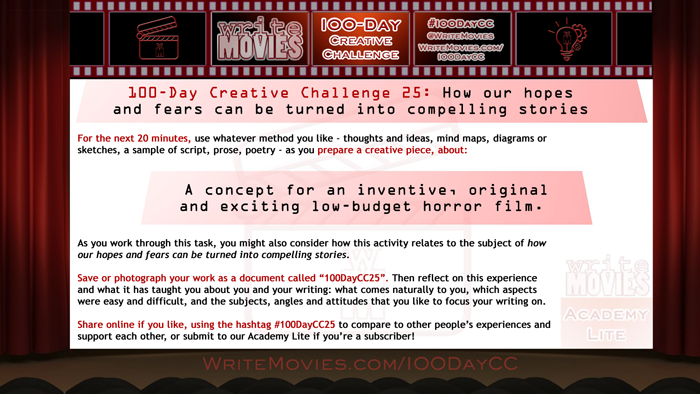Welcome to the twenty-fifth of our Creative Challenges. WriteMovies’ 100-Day Creative Challenge 25 is about how our hopes and fears can be turned into compelling stories.
Guidance: For the next 20 minutes, use whatever method you like – thoughts and ideas, mind maps, diagrams or sketches, a sample of script, prose, poetry – as you prepare a creative piece, about:
A concept for an inventive, original and exciting low-budget horror film.
- As you work through this task, you might also consider how this activity relates to how our hopes and fears can be turned into compelling stories.
- Save or photograph your work as a document called “100DayCC25”. Then reflect on this experience and what it has taught you about you and your writing: what comes naturally to you, which aspects were easy and difficult, and the subjects, angles and attitudes that you like to focus your writing on.
- Share online if you like using the hashtag #100DayCC25 to compare to other people’s experiences and support each other, or submit to our Academy Lite if you’re a subscriber!
When you complete the Challenge – or if you get completely stuck – then look at the Feedback below!
Feedback:
These may not be the most popular or acclaimed movies – but when they break through they’re usually by far the most profitable! Click HERE to see my thoughts about the horror genre. Lowbudget horror is usually the best genre to break into as a new writer, and can lead to other areas. Many companies frequently commission horror projects – this is how our Elite Consultants Bobby Lee Darby and Nathan Brookes got into the industry, and after succeeding in winning and delivering the scripts for some horror sequels that had already been greenlit, they got to write an original action thriller of their own choosing, knowing it would be produced. That’s a good way to reach your goals.
So what makes a great lowbudget horror? In a word, a great concept. You can make a virtue out of the constraints, for example by trapping your characters in one place. CUBE uses just one set, as a succession of rooms that the characters have to escape from in sequence!
It’s too easy just to throw derivative horror tropes together and see what sticks. But true success here is about getting under our skin and making us emotionally invest in the characters and story – so we feel every scare and every wound personally just as they do. Great horror is a supremely cathartic experience. It’s not about gore or ghosts – it’s about confronting our fears, and when you understand that, you can come up with some far more original ways to explore this genre than many writers who submit to our contests do. The original Spanish and Japanese versions of REC and RING were fantastic low-budget chillers.
Looking beyond the low-budget end, some horror films I’ve enjoyed in modern times include GET OUT – meeting its producers was a real pleasure too – THE DESCENT, and THE HILLS HAVE EYES remake. All of them execute an eerily-plausible premise that got under my skin. For supernatural, IT was a good chiller and coming-of-age story too: watch the time it takes to build up to its scares. The SAW franchise, in contrast, just feels cruel and compassionless to me – as does THE HUMAN CENTIPEDE series – but they still sold very well at the cinema, several times over.
General tips and feedback:
Many writers, naturally, don’t find it easy to be creative ‘on tap’ – especially for work that they didn’t set themselves. But to write professionally, you will usually need to meet deadlines and requirements, that can’t be put off, for briefs you didn’t choose for yourself: even if you’re ill or feeling down, you’ll usually have to just find a way through, and get the results that are needed, to the quality that’s necessary. So the WriteMovies Creative Challenges are designed to help you find ways around the crucial issues of ‘block’.
We do this by setting a (deceptively!) simple brief, and encouraging you to use a variety of methods, approaches and creative products in order to find ways around it, and generate some kind of outcomes that might be useful to you in the future. Whatever state your mind and mood are in – energetic or tired, stimulated or bored, motivated or disengaged, etc – there are different ‘modes’ of creative productivity which you can engage, to make the best of it: editing your work if you can’t write, making notes if you can’t generate script, etc. Try a mix of methods to make the most of activities such as the Creative Challenges, especially anytime you get stuck: just keep adding notes, sketches etc freely, you can decide later whether any of them are useful! Also note that the brief is to ‘prepare’ a creative work – not to actually make it straight away, before you feel ready to! But if you’ve come away from this with a passage of prose or script or even poetry, well done!
Hopefully this activity will have shown you the potential value of our Creative Challenges, and the benefits of making a routine to complete them, and persisting with it day by day to gradually improve all aspects of your writing and to develop solutions to ‘block’, that you will become more and more proficient with over time. We recommend that you commit to fulfilling the 100-Day Creative Challenges, sharing your outputs to gain the support and feedback of other writers working on the same activities, and if you’d like expert daily feedback from us on this and much more, additional material, subscribe to the WriteMovies Academy Lite now!


